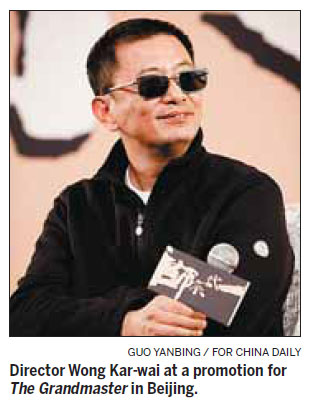Wong takes kung fu triumph to New York
 0 Comment(s)
0 Comment(s) Print
Print E-mail China Daily, August 13, 2013
E-mail China Daily, August 13, 2013
|
|
The event was held at the Museum of the Moving Image in Queens, New York, and included a post-screening onstage interview with the director. A lively question-and-answer session with the audience followed, during which one audience member shouted from a back row that she had worked briefly for Wong on the film and was wondering if he would be her reference for her film school application.
"Talk to me after," the 57-year-old director sporting his signature sunglasses replied.
Wong is widely considered one of the most influential film directors of his generation, both inside and outside of Asia. Saturday's premiere was the centerpiece of a comprehensive retrospective of Wong's work, which began on July 12 and includes all 10 of his feature films. The retrospective continues with screenings of My Blueberry Nights, In the Mood for Love and 2046 before it ends on Aug 24.
Wong's latest feature, in which he seeks to re-invent the martial arts genre, reunites Tony Leung and Zhang Ziyi, the stars of his science-fiction epic 2046. Neither actor has a background in martial arts, and both spent three years training for the film's fight sequences.
"I always wanted to make a kung fu film, but there have been so many kung fu films made before me and so I had to find my angle," Wong says.
The film tackles the story of Ip Man, played by 51-year-old Leung, who pioneered the popular Wing Chun fighting style and taught kung fu legend Bruce Lee.
In The Grandmaster, Wong seeks to capture the nobility and formality of Chinese kung fu as it existed in the 1930s and '40s, as well as today with its competing schools, traditions and philosophies.
The director says he considered naming the film The Grandmasters, but his son talked him out of it, arguing that the film was more about the idea of what it takes to be a grandmaster than the grandmasters themselves.
Wong says he wanted to set the record straight on the Ip Man story, as opposed to merely dazzling audiences with another kung fu movie. The original rendition of the Ip Man saga in cinematic form was released as a semi-biographical story in 2008, which was followed by Ip Man 2 in 2010.
Wong spent 22 months on a budget of $25 million to shoot the film.
Wong missed a number of release dates before The Grandmaster finally reached theaters on the Chinese mainland in January. The film is Wong's greatest commercial success to date, having earned more than $50 million worldwide. In China, it out-grossed his previous four features combined.
"To make this film is like a dream come true," Wong says. "I grew up on streets full of martial arts schools, but I was never allowed to practice martial arts."
When he was growing up, he says, martial arts schools were dark and mysterious and sometimes associated with the triad gangs - groups that became prevalent in Hong Kong during the 1960s and '70s. No parent would encourage their child to practice martial arts, says Wong.
At the end of the film, a boy stares intently through the window at Ip Man's martial arts studio.
"That could be Bruce Lee or that could be me because it was always my dream to walk through the door to find out what's so special, what's so mysterious about Chinese martial arts," Wong says. "With this film, I walked past this door and I find it very satisfying."







Go to Forum >>0 Comment(s)